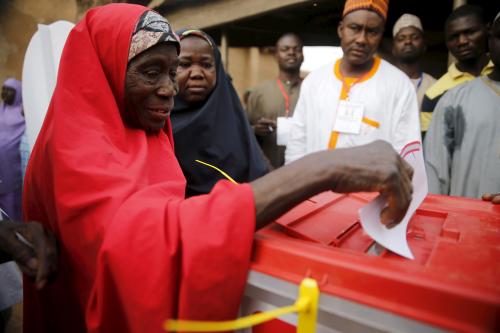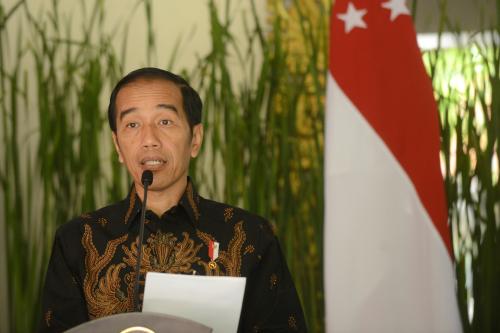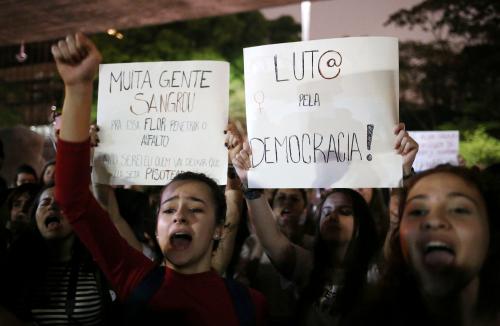On April 17, Indonesians will go to the polls to vote in the country’s fifth general election since 1998 when their country’s transition to democratic rule began. Once again, the upcoming election will be a match-up between the two men who ran against each other five years ago: incumbent President Joko Widodo (commonly called Jokowi) and retired lieutenant general Prabowo Subianto.
The outcome matters to the U.S. for several reasons. At 268 million people, Indonesia has the world’s fourth-largest population after China, India, and the United States. It is the largest Muslim-majority nation in the world and one of the very few of these that successfully established a democratic political system. Indonesia also leads the 10-nation Association of Southeast Asian Nations (ASEAN) community, which has built an enviable record of peace and prosperity in the sub-region over the past 30 years and is a major economic partner of the U.S.
The upcoming election is arguably more crucial than the previous four. Some analysts, including Tom Power, warn that it will lead the country back toward the kind of authoritarian rule experienced in the 30 years up to 1998 under General Suharto. Like Suharto, Jokowi has cracked down on his critics, especially the hardline Islamist groups that sponsored mass rallies in 2016 and 2017 against Indonesian politician Basuki Tjahaja Purnama (known for his Chinese nickname Ahok, but now prefers to be called BTP). BTP was Jokowi’s ticket-mate in the 2012 election for governor of Jakarta and became governor after Jokowi became Indonesia’s president. The mass rallies three years ago led to BTP’s election defeat for the Jakarta governorship in 2017 and his subsequent jailing on blasphemy charges.
Subianto embodies even stronger authoritarian tendencies. He continues to refuse to address questions regarding his alleged involvement in the disappearance of dozens of pro-democracy activists during the final days of the Suharto regime in 1998. (At the time, he was married to one of Suharto’s daughters.) More broadly, his human rights record stands out for being one of the worst among the army generals during the Suharto era.
Most conservative and hardline Islamist groups have supported Subianto’s candidacy. Consequently, a key step in Jokowi’s re-election campaign was to bolster his Islamic credentials by choosing as his running mate Ma’ruf Amin, a 75-year old conservative Islamic cleric who issued several controversial religious edicts (fatwas). One such fatwa declared ex-governor Purnama to have committed religious blasphemy, while another condemned the Ahmadi Muslim minority sect.
There is evidence that Jokowi is losing support among the more conservative Muslim population. Research in battleground provinces like West Java, West Sumatra, and South Sulawesi indicates that Subianto is either ahead or is running even with Jokowi.
As reported in a January 9 Voice of America piece, a recent survey by one of the more reliable public opinion firms in Indonesia gave Jokowi a 55 percent approval rating compared to 35 percent for Subianto. However, the number of undecided voters in recent opinion surveys remains high.
Jokowi’s campaign team is worried that the high number of undecided voters is a sign that many who voted for him five years ago will sit out the April election. These fence-sitters include liberals disappointed with the president’s weak commitment to resolving chronic human rights abuses, and religious minorities (ethnic Chinese Christians in particular) concerned about his unwillingness to denounce the blasphemy charges against BTP and his pro-Islamic campaign rhetoric.
Another vulnerability for Jokowi is the nation’s economic performance during his first term. Indonesia’s exceptional track record of sound macroeconomic policies since the transition in 1998 has been maintained. However, as The Jakarta Post noted in a 2016 article, he has been unable to lift the growth rate from the lackluster pace under his predecessors. His promised surge in infrastructure investment has not materialized, the state enterprise sector is largely unreformed, and a host of environmental challenges are not being addressed adequately.
The possibility that disenchanted voters will abstain from the election and that enthusiasm among potential voters backing Subianto will produce a surge of votes in his favor has led independent observers (including one of us—Alexander) to conclude that electoral support for both candidates is actually in a statistical dead heat.
The one point of consensus among most analysts is that neither of these two candidates is a committed democrat, implying that Indonesia is likely to continue drifting away from democratic rule in the near term.
A Jokowi-led government will clearly be more aligned with American values than a Subianto-led government because it will be more respectful of human rights and the rule of law. By contrast, a Subianto-led government might be more favored by the Trump administration due to its tough-guy, authoritarian approach to domestic governance and its hardline foreign policies.
The best outcome for long-term U.S.-Indonesia relations would arguably be a landslide victory for Jokowi that makes it easier for him to fix some of the weaknesses of Indonesia’s democratic political system, especially the role of the parliament. His policy leverage during a second five-year term may be enhanced significantly. According to a January 23 piece in Republika, Jokowi’s party, the Indonesian Democratic Party Struggle (PDIP), and its coalition allies are expected to control approximately 56 percent of seats in the new parliament that will also be elected on April 17.
The Brookings Institution is committed to quality, independence, and impact.
We are supported by a diverse array of funders. In line with our values and policies, each Brookings publication represents the sole views of its author(s).








Commentary
Indonesia’s imminent presidential election
March 6, 2019